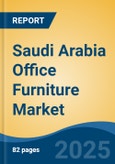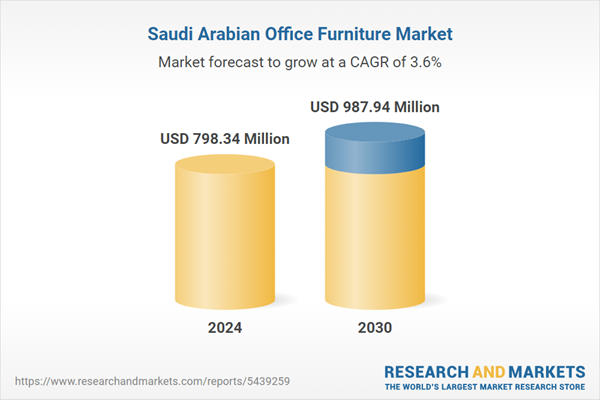Speak directly to the analyst to clarify any post sales queries you may have.
10% Free customizationThis report comes with 10% free customization, enabling you to add data that meets your specific business needs.
Also, there is a growing emphasis on employee well-being and productivity, leading to higher demand for ergonomic and adjustable furniture solutions. Technological advancements have also contributed to the development of smart office furniture, integrating features like wireless charging and IoT connectivity. Also, increasing awareness about sustainability is encouraging the adoption of eco-friendly materials and designs. Together, these factors are reshaping the Saudi office furniture market, making it more innovative and employee centric.
Key Market Drivers
Rising IT Sector Across the Region
The rapid expansion of Saudi Arabia's IT sector is a significant driver of growth in the nation's office furniture market. As a part of this, according to a recent study, as of 2024, Saudi Arabia's IT sector is projected to be worth US$50.60 billion in 2024 and US$76.05 billion in 2029. As part of Vision 2030, Saudi Arabia is diversifying its economy by investing heavily in digital infrastructure and technology hubs like Riyadh Techno Valley and Digital City. These initiatives have attracted numerous tech companies, leading to a surge in demand for modern office spaces.Consequently, there's an increased need for contemporary office furniture that supports collaborative work environments and integrates technological features. The emphasis on employee well-being and productivity has further propelled the demand for ergonomic and smart furniture solutions. Also, the rise of remote and hybrid work models has influenced office layouts, prompting businesses to adopt flexible and modular furniture designs. This evolving landscape underscores the integral role of the IT sector in shaping the future of office furniture demand in Saudi Arabia.
Key Market Challenges
Fluctuating Prices of Raw Material
Fluctuating raw material prices pose a significant challenge to the Saudi Arabia office furniture market, impacting both production costs and supply chain stability. The country's limited domestic production of essential materials like wood and metal necessitates reliance on imports, making the industry vulnerable to global price volatility. Geopolitical tensions, such as the Russia-Ukraine conflict, have disrupted supply chains, leading to increased costs for timber and other materials.Also, the Saudi government's efforts to reduce import dependency, including increased tariffs on imported furniture effective from June 2020, have further strained the market. These factors contribute to higher production costs, which can lead to increased prices for consumers and reduced profit margins for manufacturers. To mitigate these challenges, companies are exploring alternative materials, investing in local production capabilities, and adopting more efficient manufacturing processes. However, until these measures are fully implemented, fluctuating raw material prices will continue to be a significant hurdle for the growth and stability of the Saudi office furniture market.
Key Market Trends
Rise of E-Commerce and Online Sales
The rise of e-commerce and online sales is significantly transforming the office furniture market in Saudi Arabia, aligning with the nation's digital transformation goals under Vision 2030. As a part of this, according to a recent study, as of 2025, the eCommerce market is expected to generate US$16.53 billion in revenue. This growth is driven by factors such as the expansion of remote work, the proliferation of digital platforms, and the increasing demand for ergonomic and modular office solutions. Consumers are increasingly favoring online platforms for their convenience, diverse product offerings, and competitive pricing. Major online retailers like Extra.com have emerged as leading players in this space, reflecting the shift in consumer purchasing behaviour. This digital shift is further supported by the government's initiatives to enhance digital infrastructure and promote e-commerce activities, making online sales a pivotal component of the office furniture market's future growth in Saudi Arabia.Key Market Players
- HNI Corporation
- Jeraisy Furniture Factory
- Al Sharq Al Masiya Trading Company
- Haworth, Inc.
- Onmuse Office Furniture Co., Ltd
- Zhejiang Sunon Furniture Manufacture Co., Ltd
- Kimball International, Inc.
- Office Space -Masahat Almaktab
- Excel Furniture
- Lotus Systems
Report Scope:
In this report, the Saudi Arabia Office Furniture Market has been segmented into the following categories, in addition to the industry trends which have also been detailed below:Saudi Arabia Office Furniture Market, By Type:
- Chairs
- Desks
- Filing
- Cabinets & Lockers
- Others
Saudi Arabia Office Furniture Market, By Raw Material:
- Wooden
- Metallic
- Plastic
- Others
Saudi Arabia Office Furniture Market, By Price Range:
- Mass
- Premium/Luxury
Saudi Arabia Office Furniture Market, By Sales Channel:
- Contract/Direct Sales
- Furniture Retail Outlets
- Online
- Others
Saudi Arabia Office Furniture Market, By Region:
- Eastern
- Western
- Northern & Central
- Southern
Competitive Landscape
Company Profiles: Detailed analysis of the major companies present in the Saudi Arabia Office Furniture Market.Available Customizations:
With the given market data, the publisher offers customizations according to a company's specific needs. The following customization options are available for the report.Company Information
- Detailed analysis and profiling of additional market players (up to five).
This product will be delivered within 1-3 business days.
Table of Contents
Companies Mentioned
- HNI Corporation
- Jeraisy Furniture Factory
- Al Sharq Al Masiya Trading Company
- Haworth, Inc.
- Onmuse Office Furniture Co., Ltd
- Zhejiang Sunon Furniture Manufacture Co., Ltd
- Kimball International, Inc.
- Office Space -Masahat Almaktab
- Excel Furniture
- Lotus Systems
Table Information
| Report Attribute | Details |
|---|---|
| No. of Pages | 82 |
| Published | July 2025 |
| Forecast Period | 2024 - 2030 |
| Estimated Market Value ( USD | $ 798.34 Million |
| Forecasted Market Value ( USD | $ 987.94 Million |
| Compound Annual Growth Rate | 3.6% |
| Regions Covered | Saudi Arabia |
| No. of Companies Mentioned | 10 |









